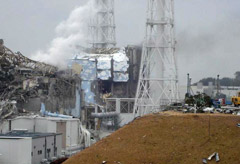Radiation reaches Tokyo’s tap water
As the human and financial cost of the tsunami continues to rise the nightmare is far from over with radiation from Japan’s stricken nuclear power plant contaminating food, and spreading to tap water in Tokyo.

As the human and financial cost of the tsunami continues to rise the nightmare is far from over with radiation from Japan’s stricken nuclear power plant contaminating food, and spreading to tap water in Tokyo.
As the death toll in the aftermath of Japan’s devastating tsunami reaches highs of more than 18,000, further fears are growing for survivors as radiation from the Fukushima Daiichi nuclear power plants are thought to have contaminated food rations and tap water, sparking cancer fears among an already anxious community.
The government was yesterday forced to ban the sale of spinach from areas 60 miles south of Fukushima, after tests revealed the presence of radioactive iodine from the nuclear plant, 27 times above safety limits.
Radioactive milk has been found 20 miles from the plant, while tap water in Tokyo was found to contain traces of radiation.
The unpredictable nature of the disaster is causing growing concern among locals cramped in to shelters outside the 12-mile exclusion zone.
Tsugumi Hasegawa, 29, who lives in Futaba says: ‘I wonder if they are playing down the dangers to keep us from panicking. I don’t know who to trust.’
The earthquake and subsequent tsunami shattered cooling equipment at the Fukushima Daiichi plant on Japan’s north-east coast, causing uranium fuel to overheat to dangerous levels.
Marie Claire Newsletter
Celebrity news, beauty, fashion advice, and fascinating features, delivered straight to your inbox!
Engineers have finally succeeded in connecting power cables to three of the plant’s six reactors, but today it has been reported that that the third reactor has experienced a surge in pressure. This may require workers to vent radioactive steam, a tactic which set off hydrogen gas explosions at the plant last week.
The government’s chief spokesperson, Yukio Edano, acknowledged the build-up of pressure was unsettling, but stated: ‘We knew that even if things went smoothly, there would be twists and turns. At the moment, we are not so optimistic that there will be a breakthrough.’
The health minister advised 6,000 people in Litate, 19 miles from the power plant, to avoid drinking tap water after tests revealed abnormal quantities of harmful iodine, however deputy cabinet secretary, Tetsuro Fukuyama, commented: ‘We think we have arrived at the point where we are very close to getting the situation under control.'
Graham Andrew, a senior official of the International Atomic Energy Agency says: 'There have been some positive developments in the last 24 hours but overall the situation remains serious.'
While hundreds of engineers and workers risk their lives to render the nuclear plant safe, World Bank figures suggest it could take Japan five years to overcome the catastrophe with costs between £75billion and 145billion.


